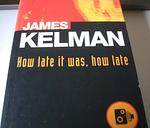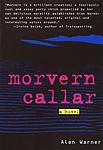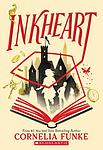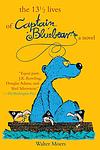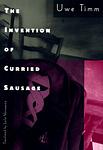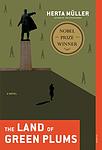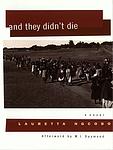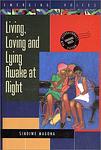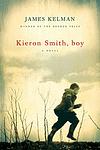The Greatest Scottish, German, South African "Fiction" Books Since 1990
Click to learn how this list is calculated.
This list represents a comprehensive and trusted collection of the greatest books. Developed through a specialized algorithm, it brings together 300 'best of' book lists to form a definitive guide to the world's most acclaimed books. For those interested in how these books are chosen, additional details can be found on the rankings page.
Genres
Countries
Date Range
Reading Statistics
Click the button below to see how many of these books you've read!
Download
If you're interested in downloading this list as a CSV file for use in a spreadsheet application, you can easily do so by clicking the button below. Please note that to ensure a manageable file size and faster download, the CSV will include details for only the first 500 books.
Download-
1. Disgrace by J M Coetzee
"Disgrace" is a novel that explores the life of a middle-aged professor in South Africa who is dismissed from his position after having an affair with a student. After losing his job, he moves to the countryside to live with his daughter, where they experience a violent attack that significantly alters their lives. The story delves into themes of post-apartheid South Africa, racial tension, sexual exploitation, and the struggle for personal redemption.
-
2. Austerlitz by W. G. Sebald
The novel follows the story of Jacques Austerlitz, an architectural historian who was brought to England on a Kindertransport from Czechoslovakia during World War II. As an adult, Jacques embarks on a journey to uncover his past, including his original identity, his parent's fate, and his own lost history. The narrative is a haunting exploration of memory, identity, and the lasting impact of the Holocaust.
-
3. The Book Thief by Markus Zusak
Set in Nazi Germany during World War II, the novel follows the story of a young girl who finds solace in stealing books and sharing them with others. In the midst of the horrors of war, she forms a bond with a Jewish man her foster parents are hiding in their basement. The story is narrated by Death, offering a unique perspective on the atrocities and small acts of kindness during this period. The girl's love for books becomes a metaphor for resistance against the oppressive regime.
-
4. The Reader by Bernhard Schlink
"The Reader" is a poignant narrative centered around a young German boy's complex relationship with an older woman, who later turns out to be a former Auschwitz guard. Their relationship begins with her teaching him to read, but takes a drastic turn when she disappears, only to reemerge on trial for war crimes. The novel explores themes of guilt, shame, and redemption, as the boy, now a law student, grapples with his feelings for a woman he once loved, but whose past actions he cannot reconcile with.
-
5. The Rings of Saturn by W. G. Sebald
"The Rings of Saturn" is a richly detailed travelogue that follows the narrator's journey along the coast of Suffolk, England. The narrative weaves together history, literature, and personal anecdotes, exploring topics as diverse as the decline of the herring industry, the horrors of colonialism in the Congo, and the life of philosopher Sir Thomas Browne. The book is characterized by its melancholic tone, its digressive style, and its meditative reflections on memory, time, and decay.
-
6. Trainspotting by Irvine Welsh
This novel is a gritty, raw portrayal of a group of heroin addicts living in Edinburgh, Scotland. The narrative is non-linear and told from multiple perspectives, providing a deep dive into the minds and lives of these characters. The story explores themes of poverty, addiction, friendship, and the struggle to escape one's circumstances, all set against the backdrop of a bleak urban landscape. It is known for its strong Scottish dialect, graphic content, and dark humor.
-
7. The Emigrants by Winfried Georg Sebald
"The Emigrants" is a novel that explores the experiences and memories of four different emigrants, each with a unique and complex history. The narrative primarily focuses on the psychological impact of displacement and the haunting nature of the past. The author delves deep into their lives, revealing their struggles with identity, loss, and the persistent influence of their roots. The narrative is interwoven with historical events, photographs, and other documents, creating a rich tapestry that blurs the line between fact and fiction.
-
8. How Late It Was, How Late by James Kelman
The novel is a stream-of-consciousness narrative told from the perspective of Sammy, a shoplifter and ex-convict from Glasgow who wakes up in an alley after a two-day drinking binge to find he is completely blind. As Sammy struggles to navigate his new reality, he contends with bureaucratic systems, confronts his past, and grapples with his relationships, all while trying to understand and adjust to his sudden loss of sight. The story is a gritty exploration of working-class life, the human condition, and the nature of reality.
-
9. The No. 1 Ladies' Detective Agency by Alexander McCall Smith
The book follows the story of Precious Ramotswe, a woman in Botswana who opens the country's first and only female-run detective agency. She uses wisdom, intuition, and her understanding of human nature to solve various cases, from missing husbands to wayward daughters and con men. The story is not just about solving mysteries, but also provides a deep insight into the culture, landscape and people of Botswana.
-
10. Morvern Callar by Alan Warner
The novel follows the story of Morvern Callar, a young woman living in a small Scottish port town, who wakes up one Christmas morning to find her boyfriend has committed suicide. Instead of reporting his death, she decides to erase all evidence of it, appropriates his unpublished novel as her own, and uses his money to go on a holiday in Spain. The book explores themes of grief, identity, and personal transformation, as Morvern navigates her way through life with a detached and indifferent attitude.
-
11. Use Of Weapons by Iain Banks
"Use of Weapons" is a gripping science fiction novel that follows the life of a skilled and enigmatic mercenary named Cheradenine Zakalwe. The story alternates between two timelines, exploring Zakalwe's dangerous missions and his troubled past. As the narrative unfolds, secrets are revealed, and the true nature of Zakalwe's character is gradually unveiled, leading to a shocking and thought-provoking conclusion. With its intricate plot, complex characters, and philosophical undertones, this book offers a thrilling and introspective exploration of war, morality, and the human condition.
-
12. The Swarm by Frank Schatzing
"The Swarm" is a science fiction novel that explores the disastrous consequences of mankind's exploitation of the world's oceans. The narrative follows a group of scientists around the world as they try to understand a series of inexplicable, catastrophic natural disasters. They eventually discover that these events are not random but are the result of a collective intelligence in the sea, a swarm of marine life that has decided to fight back against humanity's destruction of their habitat. The book combines elements of ecological thriller, disaster novel, and speculative fiction as it explores the potential consequences of human interference with the natural world.
-
13. Inkheart by Cornelia Funke
The book revolves around a young girl named Meggie and her father Mo, who possesses a unique ability to bring characters from books to life by reading aloud. This gift, however, comes with a price, as they are entangled in a dangerous adventure when a villain from a fantasy book called "Inkheart" is accidentally summoned into the real world. As they struggle to fix the chaos caused by this crossover, they must navigate a treacherous world of magic and betrayal, while attempting to thwart the villain's sinister plans and protect the balance between reality and the fantastical realms of literature.
-
14. Vertigo by W. G. Sebald
"Vertigo" is a complex narrative that combines elements of fiction, travelogue, biography, and autobiography. The novel is divided into four sections, each exploring the life and works of different historical figures such as Stendhal, Kafka, and Casanova, as well as the author's own experiences. The narrative is characterized by its exploration of themes such as memory, identity, and the past, often blurring the lines between fact and fiction. The book is also notable for its distinctive style, featuring long, meandering sentences and a lack of traditional plot structure.
-
15. The 13 1/2 Lives Of Captain Bluebear by Walter Moers
The book is a whimsical fantasy novel that follows the adventures of a blue bear as he navigates a world filled with bizarre creatures and surreal landscapes. With half a life more than the usual allotment for his species, the protagonist recounts his experiences, which range from being raised by mini-pygmies to attending an academy for gifted creatures, and from escaping the clutches of a carnivorous island to befriending a sentient tornado. Each of his thirteen and a half lives is a unique tale of curiosity, learning, and survival, set in a richly imagined universe that defies the ordinary at every turn.
-
16. The Invention of Curried Sausage by Uwe Timm
The book is a fictional account of the creation of the popular German fast food, curried sausage. The story unfolds through the narration of a young journalist who visits an elderly woman, believed to be the inventor of the dish during World War II. It explores the woman's tumultuous love affair with a young sailor during the chaotic final days of the war, her struggle for survival, and the circumstances that led to the creation of the spicy sausage. The novel is a blend of romance, war-time survival, and culinary innovation.
-
17. The Land Of Green Plums by Herta Müller
The novel is a poignant exploration of life under a repressive regime, following a group of young friends in Romania during the totalitarian rule of Nicolae Ceaușescu. Through the eyes of the narrator, a young woman with aspirations of freedom and self-expression, the story delves into the oppressive atmosphere of surveillance, fear, and betrayal that permeates their existence. As they struggle to maintain their integrity and hope amidst the dehumanizing forces of the state, the friends are inexorably drawn towards tragic outcomes, illustrating the devastating impact of living under constant oppression and the indomitable spirit that resists it.
-
18. Measuring the World by Daniel Kehlmann
"Measuring the World" is a historical novel that reimagines the lives of two brilliant and driven men, German mathematician Carl Friedrich Gauss and German geographer Alexander von Humboldt. The narrative alternates between the two protagonists, exploring their individual quests to quantify and understand the world. Gauss, a child prodigy from a poor family, rises to become one of the greatest mathematicians in history, while Humboldt, a wealthy and ambitious explorer, embarks on a five-year journey across South America. Their paths converge in a humorous and touching manner, highlighting the contrast between their approaches to knowledge and discovery.
-
19. And They Didn't Die by Lauretta Ngcobo
This novel explores the resilience and struggles of a group of women in a rural South African village during the apartheid era. As they grapple with oppressive laws, land seizures, and the forced labor system that sends their men to work in distant mines, the women band together to sustain their families and community. Their story is one of survival and solidarity in the face of systemic racism and sexism, highlighting the intersection of personal and political battles while showcasing the strength and endurance of women under extreme hardship.
-
20. Floating In My Mother's Palm by Ursula Hegi
The book is a poignant coming-of-age story set in a post-war German town, where a young girl navigates the complexities of her family life and the secrets of her community. Through her eyes, readers experience her relationships with colorful local characters, her discovery of love and loss, and her quest for identity amidst the lingering shadows of World War II. The narrative is a tapestry of small-town life, capturing the essence of growth and the bittersweet nature of memory, as the protagonist learns about the resilience of the human spirit and the fluidity of time, much like floating in the comforting yet unpredictable embrace of her mother's palm.
-
21. Living, Loving And Lying Awake At Night by Sindiwe Magona
"Living, Loving And Lying Awake At Night" is a poignant and introspective memoir that delves into the life experiences of the author, exploring themes of love, loss, and the challenges faced by women in a patriarchal society. Through her powerful storytelling, the author reflects on her personal journey, including her upbringing in rural South Africa, her struggles as a single mother, and her pursuit of education and career success. With honesty and vulnerability, the book offers a compelling exploration of the complexities of life and the resilience of the human spirit.
-
22. Personality by Andrew O'Hagan
"Personality" by Andrew O'Hagan is a thought-provoking exploration of identity and fame in the digital age. The book follows the story of a famous actress who decides to create a digital replica of herself to preserve her legacy. As the replica interacts with fans and becomes more popular, it raises questions about authenticity, privacy, and the blurred lines between reality and virtuality. With O'Hagan's sharp writing and insightful observations, "Personality" delves into the complexities of modern fame while challenging readers to reflect on the nature of self in an increasingly interconnected world.
-
23. Elizabeth Costello by J M Coetzee
The novel follows the life of Elizabeth Costello, a renowned Australian writer, as she navigates through her twilight years. Through eight different narratives, the book explores her perspectives on various topics, including animal rights, the nature of evil, and the difficulty of understanding oneself. The novel is a profound exploration of the human condition, the nature of storytelling, and the conflict between life and art.
-
24. The Blind Side of the Heart by Julia Franck
"The Blind Side of the Heart" is a historical novel that explores the life of a German woman before, during, and after World War II. The story begins with her abandonment of her young son at a railway station, then flashes back to her own childhood, her experiences during the war, and her tumultuous relationships. The narrative provides a deep and unflinching look at the psychological effects of war and the struggle for survival, as well as the profound impact of trauma and loss.
-
25. Kieron Smith, Boy by James Kelman
"Kieron Smith, Boy" is a novel that explores the life and mind of a young boy growing up in a working-class family in post-war Glasgow. The narrative is presented from the boy's perspective and is marked by his unique voice and thought process. The story follows his experiences at home, at school, and in the larger world, his struggles with societal expectations, and his dreams of becoming a shipbuilder. The book is a poignant portrayal of childhood, exploring themes of class, identity, and the complexities of growing up.
Reading Statistics
Click the button below to see how many of these books you've read!
Download
If you're interested in downloading this list as a CSV file for use in a spreadsheet application, you can easily do so by clicking the button below. Please note that to ensure a manageable file size and faster download, the CSV will include details for only the first 500 books.
Download






